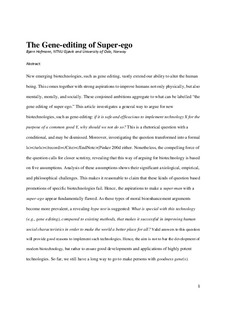| dc.description.abstract | New emerging biotechnologies, such as gene editing, vastly extend our ability to alter the human being. This comes together with strong aspirations to improve humans not only physically, but also mentally, morally, and socially. These conjoined ambitions aggregate to what can be labelled “the gene editing of super-ego.” This article investigates a general way used to argue for new biotechnologies, such as gene-editing: if it is safe and efficacious to implement technology X for the purpose of a common good Y, why should we not do so? This is a rhetorical question with a conditional, and may be dismissed as such. Moreover, investigating the question transformed into a formal argument reveals that the argument does not hold either. Nonetheless, the compelling force of the question calls for closer scrutiny, revealing that this way of arguing for biotechnology is based on five assumptions. Analysis of these assumptions shows their significant axiological, empirical, and philosophical challenges. This makes it reasonable to claim that these kinds of question based promotions of specific biotechnologies fail. Hence, the aspirations to make a super-man with a super-ego appear fundamentally flawed. As these types of moral bioenhancement arguments become more prevalent, a revealing hype test is suggested: What is special with this technology (e.g., gene editing), compared to existing methods, that makes it successful in improving human social characteristics in order to make the world a better place for all? Valid answers to this question will provide good reasons to pursue such technologies. Hence, the aim is not to bar the development of modern biotechnology, but rather to ensure good developments and applications of highly potent technologies. So far, we still have a long way to go to make persons with goodness gene(s). | nb_NO |
